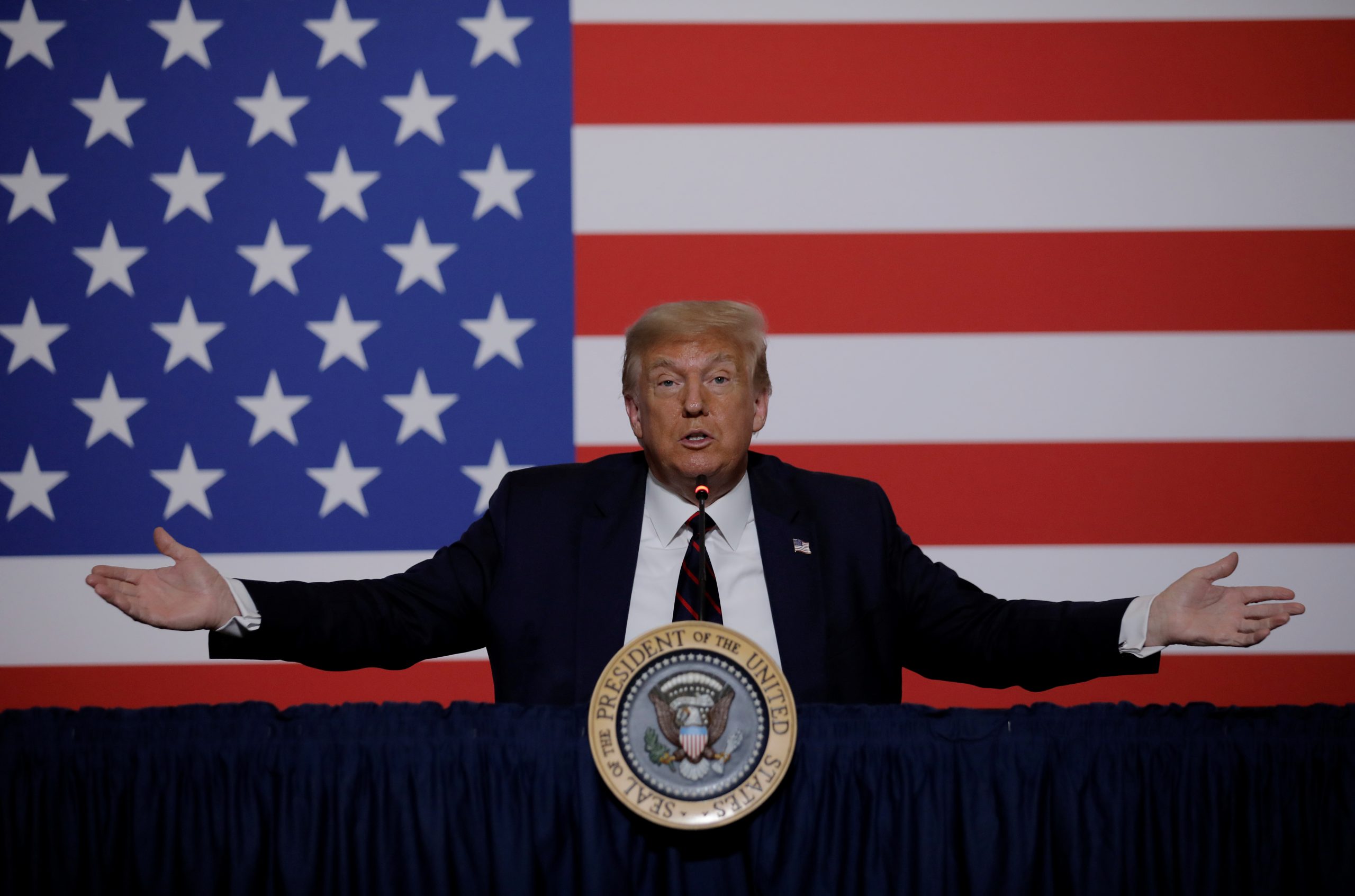President Donald Trump’s suggestion on Thursday the Nov. 3 presidential election be delayed due to voter fraud was immediately rejected by lawmakers and dismissed by legal experts, but it raises the specter of a disputed election that could take weeks or even months to resolve.
Here are some of the messy scenarios at play – and how they might unfold:
DELAYED RESULTS
Under the Constitution, only Congress has the power to change the date of the election – and with Democrats in control of the U.S. House of Representatives, there is essentially no chance of that happening.
But the widespread use of mail ballots thanks to the pandemic will likely cause significant delays in tallying results. In many states, they can arrive after Election Day, and officials must open them by hand and verify signatures. Already this year, some primary elections held mostly by mail have remained unsettled for weeks after Election Day.
Democrats worry such delays could allow claims of fraud to gain traction.
A person briefed by Joe Biden’s campaign said the Democratic candidate’s staff was bracing for a “nightmare scenario” in which Trump declares victory based on leading the in-person vote count in battleground states on Nov. 3.
But in the ensuing days, as mail-in ballots from densely populated urban areas are counted, his advantage disappears in what experts call the “blue shift” – and the president claims the contest is being stolen from him.
THE COURTS
States have varying laws regarding mail-in and absentee ballots – signature matching, postmark requirements, application deadlines – and any could prompt litigation by either Democrats or Republicans over which ballots should be properly counted.
Presidential nominating contests held this year also exposed massive challenges in delivering mail ballots on time, as election officials and post offices were overwhelmed by the surge.
Voters who cannot get their ballots back in time through no fault of their own could be effectively disenfranchised. That could spark legal challenges in states where the race is decided by slim margins.
Litigation filed in individual states could eventually reach the U.S. Supreme Court, as it did in 2000, when Republican George W. Bush prevailed over Democrat Al Gore by just 537 votes in Florida after the conservative-leaning high court halted a recount.
The current court’s conservative majority has generally been permissive of voting restrictions. But that does not necessarily suggest the court would lean toward Trump in a dispute over the election results, legal scholars say.
ELECTORAL COLLEGE
Perhaps even more worrisome than litigation is the possibility of an Electoral College dispute, some experts say.
The U.S. president is not actually elected by a majority of the popular vote. Under the Constitution, 538 electors – known as the Electoral College – determine the winner.
In practice, the candidate who wins each state’s popular vote typically collects that state’s electors, which are apportioned based on population. The governor of each state certifies the electors’ vote, which takes place this year on Dec. 14, and submits it to Congress for its approval.
In a new book, “Will He Go?” Amherst College law professor Lawrence Douglas outlined a scenario in which the results in three swing states – Michigan, Wisconsin and Pennsylvania – are so close that both sides claim victory.
The Republican-controlled legislatures in each state, egged on by Trump, submit their own certificates awarding the electors’ votes to Trump, even as the states’ Democratic governors send separate certificates giving Biden the votes.
States have occasionally submitted competing certificates in U.S. history, most notably in 1876, when the election remained unsettled for months. The dispute was resolved only after party officials brokered a deal giving Republican Rutherford B. Hayes the presidency in exchange for withdrawing U.S. troops left over from the Civil War from Southern states, a move that helped usher in the Jim Crow era of racial segregation.
The Supreme Court recently ruled that states could punish “faithless electors” who cast votes for someone other than the winner of their state. But more than a dozen states have no rules against faithless electors.
Under the federal Electoral Count Act, Congress is responsible for resolving Electoral College disputes, not the Supreme Court. But the law is ambiguous, Douglas said, and a split Congress may not easily agree on a solution.
“If you ask whether our constitutional legal system is designed to deal with an electoral crisis, the answer is, it really isn’t,” Douglas said.
MILITARY TO ESCORT HIM OUT?
Some experts said they were most concerned about the lasting damage to democratic norms if Trump refuses to concede defeat, even if Biden is declared the winner.
Peaceful succession is a hallmark of U.S. democracy. The Supreme Court’s ruling in Bush v. Gore did not end the election, Douglas said; Gore’s decision to accept it did.
Biden has suggested the military might need to “escort” Trump out of the White House if he loses but refuses to leave. Whoever is sworn in as president on Jan. 20 will command both the armed forces as well as executive-branch security agencies, like the Secret Service.
Trump’s rhetoric could also leave millions of his supporters convinced the election was rigged – and, perhaps, lead to further unrest after months of protests over racial inequity.
“This is yet another example of the president seeking to delegitimize the election process before it happens,” Justin Levitt, a constitutional law professor at Loyola Marymount University, said of Trump’s latest tweet. “That is deeply destabilizing.”
Mark Brewer, an elections lawyer who is helping train Democratic legal volunteers in Michigan, said the best way to avoid an extended legal battle would be for Biden to win by a wide margin.
“Democrats have to make sure this election is not close,” he said.
(Reporting by Joseph Ax; Additional reporting by Michael Martina and Phil Stewart; Editing by Soyoung Kim and Alistair Bell)























